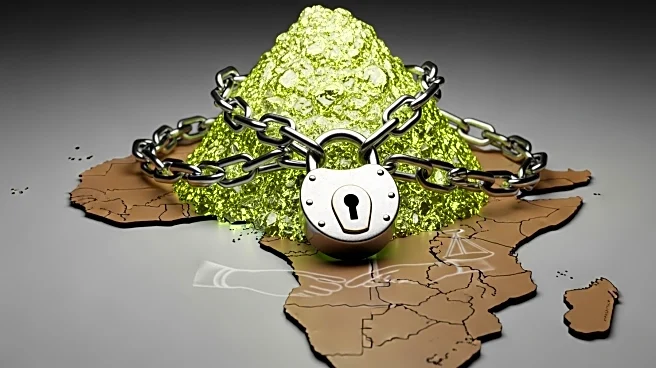What is the story about?
What's Happening?
French nuclear group Orano has reported that 1,500 metric tons of uranium are stockpiled at its expropriated SOMAIR mine in northern Niger. The company is prepared to seek compensation and pursue criminal charges if the uranium is seized or sold without authorization. This development follows Niger's military government's decision to block operations at the mine and move towards nationalization. Orano has initiated arbitration at the World Bank’s International Center for the Settlement of International Disputes. A World Bank tribunal recently ordered Niger to halt the sale or transfer of uranium mined before the suspension of operations. The uranium, valued at approximately $270 million, remains stored at the SOMAIR site, with no official sales reported.
Why It's Important?
The situation underscores the geopolitical tensions surrounding resource control in Africa, particularly in countries with military-led governments like Niger. Orano's uranium stockpile is significant, given that Niger is a major global producer of nuclear fuel. The expropriation reflects a broader regional trend of governments asserting control over natural resources, which could impact international energy markets and foreign investments. The potential involvement of countries like Iran, Russia, and Turkey as buyers adds a layer of complexity, potentially affecting global diplomatic relations and energy security.
What's Next?
Orano's arbitration process at the World Bank could set a precedent for international resource disputes. The outcome may influence how foreign companies operate in regions with unstable political climates. Additionally, the international community, including potential buyers, will be closely monitoring the situation, as any unauthorized sale could lead to diplomatic tensions. Niger's government, facing accusations of exploitation by foreign firms, may continue to assert control over its resources, impacting future foreign investments.
Beyond the Headlines
The expropriation of Orano's uranium stockpile highlights ethical concerns about resource exploitation in developing countries. Niger's government has accused foreign companies of enriching themselves at the expense of local communities, raising questions about the fairness and sustainability of international resource agreements. This situation may prompt a reevaluation of how resource-rich countries negotiate with foreign entities, potentially leading to more equitable and transparent practices.
















